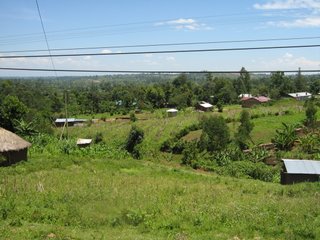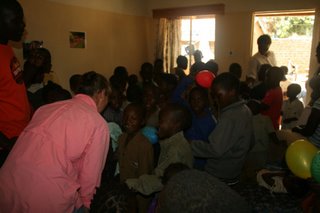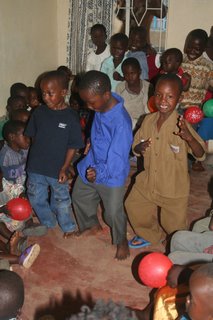
As you can see, chicken #1 has two new friends. The generosity of people who have so little is simply overwhelming. Chickens that are kept by rural families represent money in the bank and are not for eating. In case of an emergency, the family will be able to sell the chicken for cash to pay unexpected expenses. That makes giving a chicken a pretty big sacrifice.
Today, we visited one of the poorest families I have met in Kenya. It was almost more than I could bear. Mwanaidi’s father, who is about 35 years old, recently had a stroke. He is almost completely paralyzed and unable to speak. He used to be a mnamba, one of the guys responsible for drumming up business for the matatu taxis. He has 2 wives and 10 children plus his mother to support and there is literally no money. The mom and 5 children live in a one room mud walled house by the side of the road. It’s furnished with a wooden couch and a single mattress in the corner covered by mosquito netting. The grown children sleep on burlap bags on the concrete floor. Every single piece of clothing they were wearing was torn and ripped.
6 moths ago, the mother gave birth to twins. Carolina was significantly smaller than average but she was able to sit up on her own. She was running a high fever but otherwise looked like she was thriving. The little boy, Hussein, was the size of a one month old baby and he was very very sick, he could barely cry he was so weak. They have no money for a doctor or medication. Most likely the baby will die soon. Incredibly, in spite of all these hardships, the mother seemed happy and never complained about her difficulties.
Every one of these families has experienced bad luck. It seems like they just get on their feet and another tragic incident arrives on their doorstep. Sepeta’s father drove a tractor for the sugar cane factory. While working one day, it turned over and broke his left arm to pieces. He was employed as a “casual worker” and therefore no one was responsible for his medical bills. He told us that he feels very lucky that he is alive and believes that the accident meant that God must have another plan for him. Our JOP girl is in actuality his niece, both of her parents died of AIDS. She is one among 6 or 7 other orphaned children he and his wife have raised in addition to their own children.
When we hear the statistic regarding how people in Kenya live on $1 a day, it can be very misleading. Most Kenyans have enough land to grow maize and vegetables to feed their families, even if it is very little. What they lack is a way to generate the $1 a day they need to buy other essentials like soap, lard, tea, sugar and to pay doctor bills. So were pleased to see that, when we visited their homes, many families have taken the information they learned at the JOP parents’ training camps very seriously and have implemented the new ideas. 2 families have planted passion fruit that can be sold as a cash crop. The 17 year old girl who acts as Bridgette’s “stepmother” learned to roast peanuts and sold them at the market.
So, happily, Just One Person is making a small difference somehow. It is a much bigger dream than we originally envisioned.
Our programs not only support the girls in school, but we are also working to change the beliefs and traditions within Kenyan families that are obstacles to their achieving self sufficiency. So while it is difficult to seemingly ignore the dire circumstances that people must live with, our Kenyan partners and I believe that our resources must go to projects that will ultimately help people feed, clothe and education their families. Knowledge and encouragement are valuable contributions to the JOP young women and their families. It brings the gift of self esteem and self reliance to people who have, by relying on foreign aid, come to believe they are not able to do for themselves. We hope that as time passes, our JOP girls and their families will start to believe that “yote yawazekana”….everything is possible.






